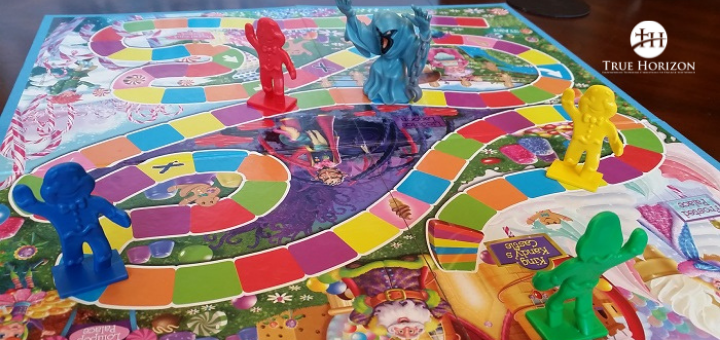Relativism: Living in Candyland
I’m going to admit something that you may find shocking. I hate Candyland. When my kids were little, I cheated at the game. I hated it because it requires no skill, no memorization, no strategy. The path to victory depends only on the random drawing of the right-colored card. That’s why I would pre-stack the cards. I had the power to do so. And that allowed my happily oblivious kids to randomly draw the exact cards they needed at exactly the right time. They would triumph at reaching the coveted Candy Castle before me. And I would get to stop playing Candyland.
Win-win.
A World Without Rules
I get it. Candyland requires no skill or strategy because it is a game for little kids. But that doesn’t change the fact that it blatantly discourages careful thinking. It is so unsystematic and muddled that blatant rule violations go unnoticed. Those in positions of power can easily manipulate the outcome. And it offers nothing but a vacuous and meaningless payoff. I boycotted the colossal waste of time called Candyland decades ago. But until reading Douglas Groothuis’s book, Truth Decay, it hadn’t dawned on me that postmodern relativism is nothing but Candyland for adults.
One of the postmodern philosophers Groothuis repeatedly quotes in the book is Richard Rorty, the former Stanford philosophy professor who died in 2007. And it’s people like Rorty – serious, educated, intellectually gifted people – who live their lives based on a worldview that effectively treats morality, ethics, and the pursuit of truth no differently than a rainy afternoon game of Candyland.
Truth Defined
There are two basic ways that we can view truth. One is a view that was first formalized by Aristotle nearly 2300 years ago. This is the correspondence theory of truth. On this view, truth is propositional. As Aristotle put it in his Metaphysics, Book 4, Part 7:
This is clear, in the first place, if we define what the true and the false are. To say of what is that it is not, or of what is not that it is, is false, while to say of what is that it is, and of what is not that it is not, is true; so that he who says of anything that it is, or that it is not, will say either what is true or what is false; but neither what is nor what is not is said to be or not to be …
In other words, true beliefs and propositions correspond to the way the world actually is.
For example, I could say that I am capable of playing on the PGA Tour and winning the U.S. Open. But because that belief does not correspond with the way the world actually is, my belief would not be true. The key is that truth “is not dependent on our mind believing it,” as Groothuis puts it (89). “The truth value of a proposition’s content is ‘mind-independent.'” Our belief about something is irrelevant. The truth of something depends on whether or not it corresponds with objective, external reality.
Correspondence -vs- Coherence
The correspondence theory of truth may sound ridiculously obvious to reasonable people. But that’s because we don’t live in Candyland. For folks like Richard Rorty and his postmodern ilk, truth is something else altogether.
Their view of truth has been given names like “constructivist,” “pragmatic,” or “consensus.” Each of these has subtle philosophical differences. But all can be categorized under what Groothuis labels the coherence theory of truth. For a coherentist, all one needs to do to find truth is identify a set of statements that are consistent with one another. Truth, they say, is not found; it is formed. Truth is constructed by the language and vocabulary used within various “communities.” And the community members decide for themselves what will be true or false.
Those who hold to this view are prone to make statements like this one from Richard Rorty:
It is useless to ask whether one vocabulary rather than another is closer to reality. For different vocabularies serve different purposes, and there is no such thing as a purpose that is closer to reality than another purpose … Nothing is conveyed in saying … that the vocabulary in which we predict the motion of a planet is more in touch with how things really are than the vocabulary in which we assign the planet an astrological influence. (quoted by Groothuis in Truth Decay, p. 93)
Incoherent “Truth”
Don’t miss Rorty’s point. According to his postmodern way of thinking, we have no basis for claiming that the statements of an astronomer about planetary motion are any “truer” than the predictions of an astrologer. Newton’s laws of motion and your horoscope carry the same weight.
Rorty, in other words, lives in philosophical Candyland — a place where any old truth will do, as long as everyone involved agrees to play by the same rules. You can even make the rules up as you go along. You can change them on a whim. This view is the philosophical basis for the relativistic culture that is engulfing us all.
Groothuis summarizes where such a view will lead (103):
… if truth is a mere social construction, with no outside reference to an independent reality, it has no ability to anchor protest, to inspire dissent, to orient the soul toward what is objectively good and to liberate those ensnared in error.
This view defies reality itself. And it is definitely not how the Christian worldview inspires us to live. It makes ethics, values, and morality into matters of consensus that we agree to construct for ourselves. When you relativize truth, all that is left to organize society is power. And those in power can stack the deck to their own ends.
Hence, my comparison to Candyland.
Living in Candyland
Back to my original problem with the game meant for little kids. The characteristics of that game are as follows:
It discourages actual thinking
The Candyland mentality is a worldview that discourages intellectual rigor because it is experientially and emotionally based. It rationalizes aberrant human behavior. It has to. No honestly thinking human could assert, as Rorty does, that astrology and science contain equal truth value unless they were either consciously or unconsciously disengaging their mind from the process of pursuing truth. No intellectually honest human being could assert, as Rorty has, that:
I do not think there are plain moral facts out there … nor any neutral ground on which to stand and argue that either torture or kindness are preferable to one another. (Quoted in National Review, 7/9/07, p. 34, “Truth Was Not His Bag”)
I’ll give him this. Rorty got the first four words of the quote right. But that leads to another inevitable consequence of living in Candyland.
It is so unsystematic and muddled that rule violations go unnoticed
Rorty, scoffing at those who hold to a correspondence theory of truth, is quoted as saying:
You can still find philosophy professors who will solemnly tell you that they are seeking the truth, not just a story or a consensus but an honest-to-God, down-home, accurate representation of the way the world is. (Ibid, p. 34)
Philosophy professors like Rorty chastise those who believe in “truth.” They insist that there is no such thing as objective truth. But the irony built into statements like these is that Rorty believes his view is true!
The fallacy of the logic is this: If they are right about the consensus theory of truth, there is no basis by which to critique those in other “communities” who hold to a different view. But they critique them anyway because — whether they acknowledge it or not — they live in the real world. And in the real world propositions are objectively true or false. They can’t escape it. They write books trying to convince you that their view is objectively true, all the while insisting that there is no such thing as objective truth.
It can be easily manipulated by those in positions of power
Just as I stacked the Candyland cards to achieve the outcome I desire, those who hold to the coherentist view of truth set the stage for misuse of the system by whoever controls it. Rorty explains how those who hold to his view of truth …
… take the unit of persuasion to be a vocabulary rather than a proposition. [Their] method is redescription rather than inference. [They] specialize in redescribing ranges of objects or events … in hope of inciting people to adopt and extend the jargon … [and] hopes that by the time [they] have finished using old words in a new sense, not to mention introducing brand new words, people will no longer ask questions phrased in the old words. (Contingency, Irony, and Solidarity, p. 78)
To use a vocabulary word Rorty would avoid, we have a name for this kind of language manipulation. We call it “propaganda.” As Doug Groothuis points out, “Nazis, communists, fascists, and assorted racists have excelled in such redescriptions.” It was Hitler who bragged that if you tell people the same lie long enough, eventually they will accept it as being true. This is not just some unintended consequence of the application of the consensus view of truth. It is, as Rorty points out, the stated goal of those who adopt it.
It offers us a vacuous and unsatisfying payoff
The payoff for living in Candyland is an empty one. Since it can change at the whim of players, it really holds no value. You can cheat by stacking the card deck in your favor, only to reach a destination that is irrelevant.
Make no mistake, those who hold to objective truth can also misuse their power and influence. But doing so demands that they suffer consequences inherent to their worldview. Players in Candyland bear no such burden. They can make or break the rules they’ve made up because their worldview demands no standard of allegiance.
Life in Candyland — or within any parallel worldview defined by situational ethics, relativistic morality, or subjective truth — is a life without foundation, devoid of anything permanent. It’s a life that serves only to fill meaningless time with pointless endeavors. If there is no objective truth or reason beyond what we create for ourselves, there can be no way to measure the value or reality of our success.
Truth is Not Arrogant
One of the critiques of the correspondence theory is that those who adhere to it are claiming to have absolute certainty about how the world really is. And they use that certainty to arrogantly and oppressively impose their views on others. But this accusation misunderstands some basic definitions. The correspondence view acknowledges that:
Truth is a property of propositions
Certainty is a property of persons
Propositions are either true or false. It doesn’t matter if we choose to believe them or not. They’re like gravity. You can deny that it’s real if you’d like. But that doesn’t mean you can step off a skyscraper without consequence.
Truth is real. And that means it is also knowable. Believing in the reality of objective truth does not mean that you are claiming to know the absolute truth exhaustively. Like gravity again, we know and understand that it works. Our behavior acknowledges it even if we cannot fully understand how it works. We know, even if we do not know completely.
Certainty, on the other hand, is a property of persons. And people may or may not be certain about true things. Ptolemy was certain that the Sun revolved around the Earth. But Ptolemy was wrong, even though he was honestly and sincerely seeking to know the truth.
Sincerity does not rescue certainty from falsity. You can be certain about false things. But you can also be quite uncertain about things that are actually true.
Escaping Candyland
Yes, there are people who try to impose their views on others. But that human tendency does not just belong to those who defend the objective nature of truth. The relativists like to impose their views too. This is not a question about who corrupts their position with misguided certainty. The real question is: Whose view of truth comports best with the way the world really works?
It sure isn’t someone living in philosophical Candyland.
The Candyland dwellers’ problem with the correspondence view of truth lies in a different area. They reject the idea of objective truth because of its nature and implications. And when you understand what those are, it is easy to see why. Doug Groothuis offers eight distinctive properties of objective truth:
- It exists and is knowable
- It is objectively real
- It is universal
- It is eternally engaging and momentous, not trendy or superficial
- It is exclusive, specific, and antithetical
- It is systematic and unified
- It is not an end, but a means to another end
- It is revealed by God
In these characteristics of Truth, the relativist finds himself judged by an unmoving standard — by a Person to whom he’s accountable. That’s something he can’t avoid or explain away. True Truth is not negotiable. It is not constructed. Adhering to it is not optional. It comes with consequences.
One cannot make up Truth. It is not a meaningless feature in a pointless little game we play for fun. Truth is the standard we use to evaluate reality. It is the most important feature of the world in which we live, and move, and have our being.
Philosophical children can play Candyland if they want to. But they shouldn’t expect us to play along with them.







So, you have confessed you are a cheater. Cheating at Candyland?! Bob! Absolved. (Wonderful post!)
I feel so much better having "confessed." I thought it would be safe to admit it now that the youngest is almost 14 🙂 I have to say I would rather be known as a reformed CandyLand con artist than a relativist of any kind.
Would Groothius argue that in every case the eight properties of objective truth hold firm? By this I mean to ask if he would argue that in every situation we are capable of discovering some single "truth" which always applies, some answer or action that embodies truth fully and completely?
Or would he admit that in many situations we are unable to discover truth, calling into question property #1?
Kevin: Would Groothius argue that in every case the eight properties of objective truth hold firm?
I hesitate to speak for Dr. Groothuis (PhD in Philosophy), but I would assume so since this is how he defines objective truth — unless I have misrepresented his view in some way.
Kevin: By this I mean to ask if he would argue that in every situation we are capable of discovering some single "truth" which always applies, some answer or action that embodies truth fully and completely?
Maybe you’re missing his point. Objective truth exists independent of any “situation.” As I thought I made clear, truth is a property of a propositional claim that either does, or does not, correspond to the way the world actually is. This means that a truth claim is either true or false, and that it applies to all people, at all times, in all places.
Perhaps you’re confusing objective truth with subjective “truth”? Or perhaps you’re making a jump to moral preferences (re: your mentioning the applicability of some action you can decide to take). Neither of these is applicable to a discussion of the existence of objective truth itself.
Kevin: Or would he admit that in many situations we are unable to discover truth, calling into question property #1?
Admit? The way you asked your question suggests that Dr. Groothuis knows and agrees with your assertion but is stubbornly refusing to let anyone else know it. Is that what you meant? And, again, it sounds like you are trying to turn this into a discussion of morality instead of a discussion of truth itself. Once again, you are confusing a couple of concepts. The status of a proposition as being true is simply about whether or not it corresponds to reality. How we come to know that is epistemology (how we know things), which is a totally different subject.
All that said, I’d still be interested in your answer regarding the statements of Christ that he came to "testify to the truth" and his claim that he was "THE way, THE truth, and THE life." He didn't say, "A" truth; he said "The" truth. Do you think he was referring to a relative truth or an absolute truth when he said that? If you think his claims could be taken as relativistic, how would you defend that view?
I'm not confusing anything. The difference is that you see objective truth and "subjective truth" as completely different things; I see them as two sides of the same coin. I thought I had explained this previously (in our other conversations), but perhaps not. Let me clarify.
My stance all along has been that some truth is objective (or absolute, or whatever word you want to apply) and that some truth is subjective (or relative, or whatever). Truth does not exist completely under one umbrella or another; rather, certain aspects of truth are absolute while some are not.
So, with regards to your Christ question, I would agree with your assertion that Jesus was making a truth claim that is absolute. He was referring to an absolute truth, not a subjective one. This, I think, is both what you wanted me to say as well as what I believe.
The important thing is this: you asked if Jesus was referring to an absolute truth. I agree. The truth of his being the way, life and truth is non-negotiable and constant. But that is only one question of truth, one instance where truth is absolute.
In many other cases, there is no absolute truth (or at the very least truth doesn't make itself clear or manifest). Now, you might argue that in those cases there is no "truth" at all or that truth doesn't apply, and that the situations are purely subjective. Okay, fair enough. If that is the case, then we are just haggling over the definitions of words. If not, I have a fundamental disagreement with you over what truth is. And I am willing to live with that.
But if the former is the case, how can Groothuis' first property of truth hold firm? Shouldn't it be the case that truth is apparent in every situation if "it exists and is knowable"?
Kevin;
I want to be clear and fair on this so … Before I try to answer (since we do seem to be talking past each other), can you give me an example of the type of "subjective truth" claim you're talking about? I want to be sure what you mean by that.
Thanks …
Kevin:
Thanks. That clears things up. I am out flying all day so I don't have time to respond fully. I will as soon as possible. While I agree with you to a point (shocking, I know 🙂 ), I think we disagree in the fact that moral knowledge is somehow in a different category than other knowledge. I reject that secularist view and will exain why later. Also, while I love Ayn Rand's novels, you have to understand that her atheism drove her own view of moral knowledge.
Thanks for the reply … I'll get back to this as I can.
As Ayn Rand said, "Reality exists as an objective absolute — facts are facts, independent of man's feelings, wishes, hopes or fears." But the way we interact with that reality is entirely subjective, a matter of perception. By this I mean that yes, we can know the truth of addition or chemistry. But in many cases (excluding murder, rape, etc.) we cannot know the truth of our moral beliefs. They are instead subjective, subject to our perception of reality and morality.
Subjective truth manifests itself within relationships, or matters of personal preference. My favorite color is green – that is truth, but subjectively so. Subjective truth applies to anything that relies on perception.
That's about as concise an answer as I can give.
Kevin,
You said: Subjective truth manifests itself within relationships, or matters of personal preference. My favorite color is green – that is truth, but subjectively so. Subjective truth applies to anything that relies on perception … As Ayn Rand said, "Reality exists as an objective absolute — facts are facts, independent of man's feelings, wishes, hopes or fears." But the way we interact with that reality is entirely subjective, a matter of perception. .
Agreed. The Ayn Rand quote is exactly what I mean by Truth. But notice that she says it is independent of feelings etc. So it doesn’t matter how you feel about truth or whether you choose to accept it. That doesn’t change anything about the truth. “The way you interact” with it has no bearing on whether or not it is true.
Yes, there are subjective truths (opinions) but they are not statements about the truth of the object being referred to; they are statements about the subject (you). When I refer to truth I do not include subjective opinion, so maybe our difference there is a simple case of definitions, BUT, you also said …
we can know the truth of addition or chemistry. But in many cases (excluding murder, rape, etc.) we cannot know the truth of our moral beliefs. They are instead subjective, subject to our perception of reality and morality.
This is a different thing. It does not follow that we can know the truth of scientific-type things but that we cannot know the truth of moral-type things. Why not? Both are propositions about objective truth.
Thinking this way is a common result of modernist thinking where issues of value, spirituality, religion etc. are thought to be irrational and personal but not “real” (like math or science). My point is that both types of things are real things that we CAN know through basic intuition and conscience (See Romans 1:20 or Psalm 19). Where the modern/postmodern philosophy sees these as mutually exclusive categories, the Christian worldview sees them as a holistic reality that we can apprehend and understand.
Where this becomes important is in how we understand the source of moral truth. Ayn Rand’s atheism (and modernist philosophy) separates them and results in a humanism that leaves the moral status of a proposition up to the whim of person. All her characters live that to the hilt — selfishness becomes a virtue (she says this over and over again). But a theistic view of the world sees moral reality as being grounded in God himself — an objective reality that we must become subservient to, not define for ourselves.